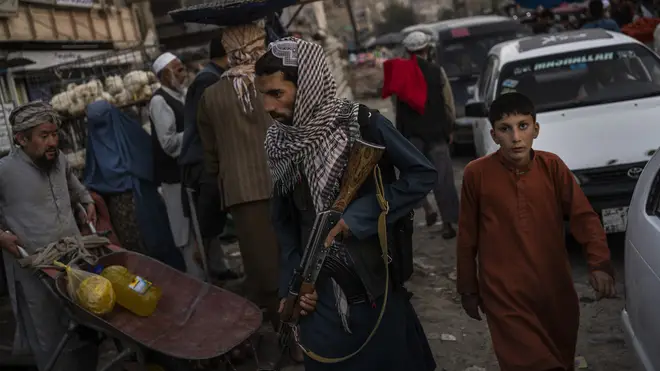
Nick Ferrari 7am - 10am
16 September 2021, 07:54

Clinics in Afghanistan’s eastern Khost province can no longer afford to clean.
The world is still wrestling with how to help Afghanistan’s impoverished people without propping up their Taliban leaders, a question that grows more urgent by the day, a month after the fall of Kabul.
With the Afghan government severed from the international banking system, aid groups both inside Afghanistan and abroad say they are struggling to get emergency relief, basic services and funds to a population at risk of starvation, unemployment and coronavirus after 20 years of war.
Among the groups struggling to function is a public health non-profit organisation that paid salaries and bought food and fuel for hospitals with contributions from the World Bank, the European Union and the US Agency for International Development.
The 600 million US dollars (£434 million) in funds, which were funnelled through the Afghan health ministry, dried up overnight after the Taliban took over the capital.
Now, clinics in Afghanistan’s eastern Khost province can no longer afford to clean, even as they are beset with Covid-19 patients, and the region’s hospitals have asked patients to buy their own syringes, according to Organisation for Health Promotion and Management’s local area head Abdul Wali.

“All we do is wait and pray for cash to come,” Mr Wali said. “We face disaster, if this continues.”
Donor countries pledged during a United Nations appeal this week to open their purse strings to the tune of 1.2 billion dollars (£868 million) in humanitarian aid.
But attempts by Western governments and international financial institutions to deprive the Taliban-controlled government of other funding sources until its intentions are clearer also has Afghan’s most vulnerable citizens hurting.
The World Bank, the International Monetary Fund and the European Union suspended financing for projects in Afghanistan, and the United States froze billions in Afghan foreign reserves held in New York.
Foreign aid to Afghanistan previously ran at some 8.5 billion dollars (£6 billion) a year – nearly half of the country’s gross domestic product.

Without access to its own or foreign funds, the interim government in Kabul cannot even pay the import taxes needed to bring containers of badly needed food from a port in Pakistan, the country’s chamber of commerce and industry vice chairman Yonus Momand said.
The West’s strategy is to strangle the Taliban’s finances to induce Afghanistan’s new leaders to respect the rights of women and religious minorities.
The all-male, hardline cabinet appointed last week includes several ministers subject to UN sanctions and one with a five million dollar (£3.6 million) FBI bounty on his head.
While it is unclear how long Afghan central bank reserves will remain out of reach, American officials insist that humanitarian groups can sidestep Taliban authorities to deliver directly to the Afghans fearing for their lives and futures in the wake of the chaotic US pullout.
“It’s definitely still possible to meet the basic needs of Afghans without rewarding the government with broader economic assistance and diplomatic recognition,” said Lisa Curtis, former South and Central Asia director of the US National Security Council.

But the situation on the ground shows the limits of that approach.
Fighting over the years has displaced more than 3.5 million people – including over half a million since the start of the year.
The price of basic goods has soared. Bank lines snake down streets as people wait hours, even days, to withdraw money so they can feed their families.
While individuals are allowed to withdraw a maximum of 200 dollars (£145) per week from Afghanistan’s banks, organisations are unable to get any funds.
Cut off from their bank accounts, groups dependent on international donors are using stop-gap methods to stay afloat, including hawala, the informal money transfer system that helped power the economy when Taliban ruled Afghanistan in the 1990s.

The ancient system, which existed in the country before banks, relies on the principle that if there are two people who want to send equal amounts of money between two locations, cash does not need to change hands.
Some countries, including the United Arab Emirates, Qatar and Uzbekistan, have avoided the messy debate over financial aid by dispatching planeloads of food and medicine to Kabul, betting that bags of rice will get distributed to the needy and not line the pockets of Taliban ministers who are on terrorism watch lists.
In maintaining its grip on the Afghan state’s foreign reserves, the US hopes to pressure the Taliban to honour their promises to create a moderate and inclusive government.
Meanwhile, doctors at a government-run paediatric hospital in Kabul say they have run out of antibiotics and gauze and are bracing for a harsh winter without heating as they treat a growing number of malnourished children.
“The economic conditions are getting worse, so the (cases) of malnutrition are increasing,” warned Noorulhaq Yousufzai, the doctor in charge of the clinic.